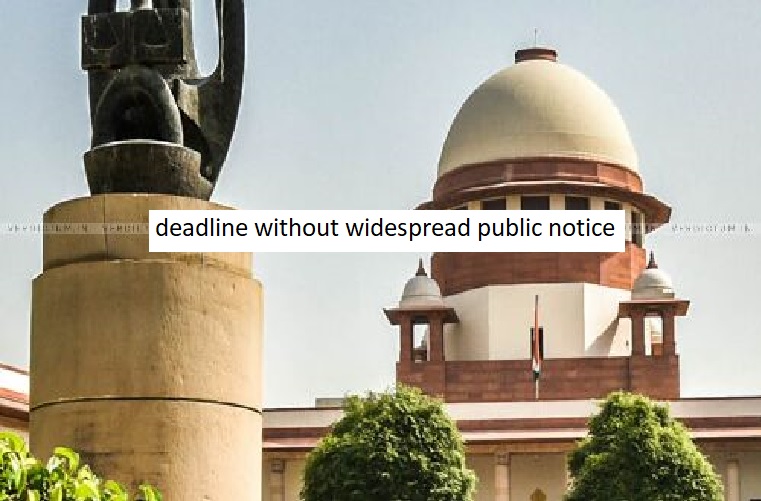


The recent pronouncement by the Supreme Court underscores the critical principle that eligibility criteria for a particular post, as delineated in the rules, cannot be relaxed beyond the application deadline unless explicit provisions for such relaxation are incorporated in the rules or advertised beforehand. The context of this legal interpretation arose in a batch of appeals pertaining to the recruitment process for the position of Junior Office Assistant (JOA) under the Government of Himachal Pradesh. The bench, comprising Justice Hrishikesh Roy and Justice Manoj Misra, presided over the case, challenging a judgment from the High Court of Himachal Pradesh.
The crux of the matter was the State Government's decision to relax essential eligibility qualifications for the JOA post, as stipulated by the Common Recruitment and Promotion Rules, 2014 (2014 Rules). This relaxation occurred subsequent to the last date specified for the receipt of applications from candidates. The High Court, in its ruling, acknowledged the purported ambiguity in the original rules that outlined the essential eligibility qualifications. Consequently, the High Court deemed the State Government's "relaxation order" as valid, leading to a significant outcome.
The judgment meant that candidates initially deemed ineligible under the original rules were subsequently considered eligible based on the relaxation order. Consequently, the merit list underwent revision, displacing candidates who, despite being eligible under the original rules, were now surpassed by those benefiting from the relaxation. This reshuffling of the merit list became a pivotal point of contention.
The Supreme Court, in hearing the appeals challenging the High Court's decision, delved into several crucial issues. Firstly, it addressed the question of whether relaxation in essential eligibility qualifications could be introduced after the application deadline. Secondly, it considered whether candidates possessing qualifications different from those prescribed in the 2014 Rules or the advertisement, albeit allegedly superior, could be deemed eligible. Lastly, it examined the power of the State (i.e., the employer) to fill all advertised vacancies and whether it could be restricted from carrying forward these vacancies based on amended or new rules.
The Supreme Court, drawing from its prior judgments, reiterated a fundamental principle: unless otherwise provided in the existing rules or advertisements, candidates must fulfill eligibility criteria by the specified deadline for application submission. The Court emphasized that any power to relax eligibility criteria, if present in the rules, could only be exercised if expressly reserved in the advertisement. Furthermore, when such power was exercised, it necessitated widespread publicity to ensure that individuals who stood to benefit from the relaxation were aware and could apply.
In the present case, the Supreme Court found that there was no indication in the advertisement reserving the power to relax essential eligibility qualifications at a later stage. Additionally, the decision to relax eligibility criteria was not sufficiently publicized. Consequently, the Court held that the State's actions were not in accordance with the established legal principles, stating that even if the State had the authority to relax eligibility criteria, such changes couldn't be made mid-stream without proper publicity, allowing similarly situated candidates an opportunity to apply and compete.
Addressing the second issue, the Supreme Court clarified that neither the existing rules nor the advertisement provided for treating any qualification other than the specified one as higher or equivalent. Therefore, candidates unable to demonstrate possession of the prescribed essential qualifications had their claims rejected.
Finally, the Supreme Court recognized the settled legal position that an employer cannot be compelled to fill all existing vacancies under the old rules. The Court asserted that in certain situations, an employer may withdraw an advertisement and issue a fresh one in alignment with new or amended rules. However, considering the duration during which appointments had been ongoing and other factors, the Court articulated that it would not be in the interest of justice to disrupt appointments made under the relaxation order, even if certain appointments were facilitated by it.
In essence, the Supreme Court's pronouncement reaffirms the importance of adherence to established rules and procedures in recruitment processes, emphasizing transparency, and fairness in the treatment of candidates. The decision serves as a guidepost for future instances where the relaxation of eligibility criteria is contemplated after the application deadline, underscoring the necessity for clarity in rules and comprehensive communication to all concerned parties.
TAGS: Supreme Court Eligibility criteria Recruitment process Junior Office Assistant (JOA) Government of Himachal Pradesh Legal principles Transparency .